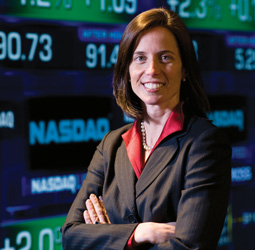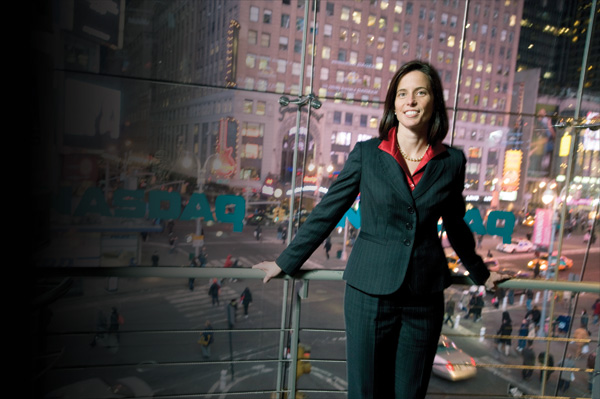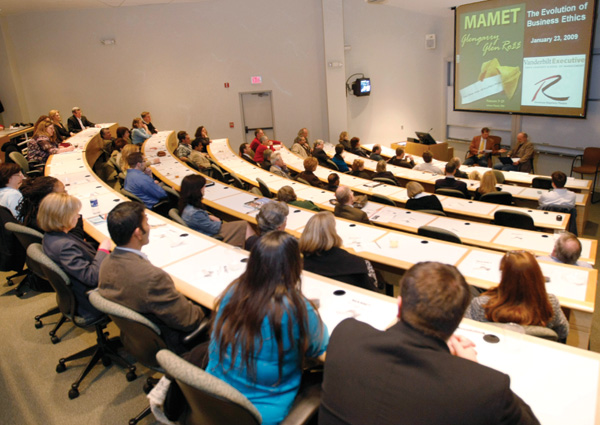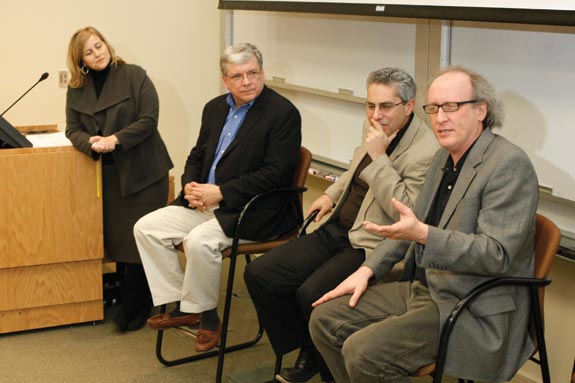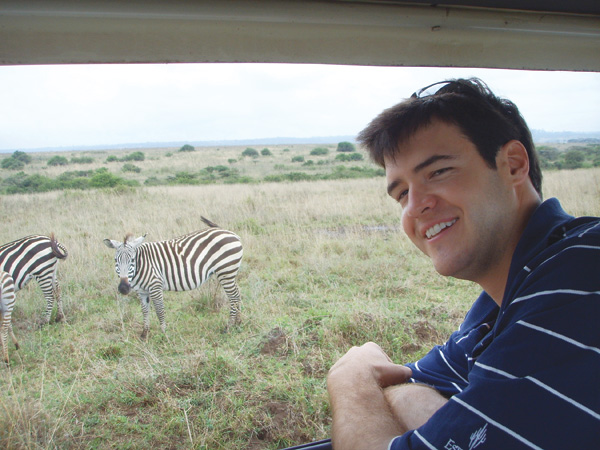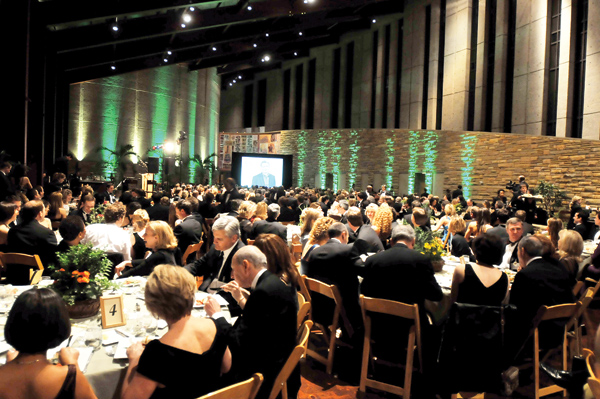Fortunately for Rob Hunter, MBA’91, clients weren’t in the habit of visiting the original headquarters of his fledgling company, Alliance Communications. Had they walked into the office—actually, a trailer in a parking lot—in 1999, they might have noticed that Alliance, which manages sophisticated telecommunications for its clients, lacked a phone system capable even of transferring calls from one extension to another. “We were double-jacking power and plumbing from the beer distributor next door,” says Hunter with the kind of head-shaking laugh that is part satisfaction, part amazement. “When employees were on the phone with a prospective client and needed to relay them to me,” Hunter remembers, “they’d say, ‘Let me transfer you to my manager,’ and then they’d hand me the phone through the wall.”
“We were double-jacking power and plumbing from the beer distributor next door,” says Hunter with the kind of head-shaking laugh that is part satisfaction, part amazement. “When employees were on the phone with a prospective client and needed to relay them to me,” Hunter remembers, “they’d say, ‘Let me transfer you to my manager,’ and then they’d hand me the phone through the wall.”
Such stories of humble beginnings are thick on the ground among successful entrepreneurs. Michael Dell originally sold computers from the trunk of his car. Microsoft launched from someone’s garage. The list goes on.
What makes the story of Hunter’s company distinctive involves the company he kept at Owen. From his MBA Class of 1991, three students who had not envisioned themselves as entrepreneurs all eventually launched entrepreneurial enterprises that now rank on the Inc. 5000 list.
Since outgrowing the trailer, Alliance has become a $15 million operation with an impressive client list and offices (real ones) in Birmingham and Mobile, Ala., and Nashville. Hunter’s best friend from his Owen days, Tom Ryan, MBA’91, started a financial communications consulting company, Integrated Corporate Relations, that today serves approximately 225 public companies around the world through offices in Boston, New York, Los Angeles and Shanghai. John Roberson, MBA’91, launched Advent Results, a pioneer in the field of “experiential marketing” that serves clients through such services as designing custom exhibit displays, planning and executing marketing events, and creating “brand spaces” that use office design to strengthen an organization’s messages to both external and internal audiences.
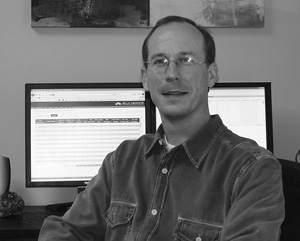
That Vanderbilt MBAs launch successful businesses is hardly a story of man bites dog. Owen, after all, over the years has earned a reputation for cultivating entrepreneurs. Still, it’s unusual to find three Inc. 5000 business starters from one relatively small class. Perhaps, someone wondered aloud, something was in the water at Owen in 1991.
Though Hunter, Roberson and Ryan took widely divergent paths to the C-suite, all shared one key thing in common besides an Owen degree: None had planned to start businesses, but all felt sufficiently empowered by their Vanderbilt training to attempt to fill what they recognized as unmet needs in the marketplace.
“I was marching down the corporate path and loving it,” Hunter says. “But when I saw an opportunity, I was not satisfied to walk away from it. That was the Owen influence. I had gained the diverse experience and analytical abilities that gave me the confidence that I could run with the opportunity.”
On that score, Hunter could be speaking for his two fellow CEOs from the Class of ’91, who say that the business tool kit they assembled at Owen made their entrepreneurial ventures more of a leap of confidence instead of purely a leap of faith. “I wouldn’t be where I am today without Owen,” Ryan says succinctly. Roberson puts it even more starkly: “As sappy as it sounds, Owen changed my life.”
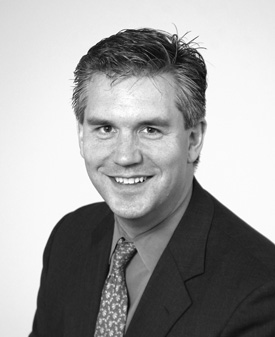
A Clear Message
Tom Ryan hadn’t even imagined himself leading a company, much less founding one. But in his second year at Owen, classmate Bob Davis, MBA’91, offered an offhand comment that planted a seed. “We were at SATCO (San Antonio Taco Co.) one afternoon, and Bob said, ‘You’d be a really good CEO,’” Ryan recalls. “I thought,‘Wow, Bob is one of the smartest guys in our class. He must see something in me I don’t.’”
As a project for one of his second-year MBA classes, Ryan worked with a local entrepreneur who was starting a slot-machine company. “I thought, ‘That’s interesting,’” he says. “‘Maybe I’ll get a free trip to Vegas.’”
He got much more. Upon graduation, as the economy was in recession but the gaming industry was exploding, Ryan went to work for the slot-machine maker. The experience was invaluable. Two years later, yearning to be closer to his native Connecticut, he took his Rolodex and began calling on Wall Street investment banks, where his detailed knowledge of the casino business was in short supply and high demand.
But after six years as an analyst, Ryan knew he didn’t want to spend his entire career in Lower Manhattan. He longed to be like his father, who operated his own accounting firm, set his own hours and had time to coach Little League.
“I was marching down the corporate path and loving it. But when I saw an opportunity, I was not satisfied to walk away from it. That was the Owen influence.”
~ Rob Hunter
And through his close interactions with top executives of public companies around the country, he came to recognize what proved to be a lucrative opportunity. “Many CEOs and CFOs were good at building their businesses,” he explains, “but they didn’t know how to communicate their story to Wall Street. More often than not, they didn’t know what I was looking for as an analyst and how to position themselves to maximize their value to the capital markets.
“So I decided to start my own company to teach executives of public companies how to interact with Wall Street.”
Along with two longtime friends, Ryan launched Integrated Corporate Relations. The new company did just what its name promised. Many companies that handle investor relations, Ryan explains, are staffed heavily with PR professionals. “But CEOs are better off hiring someone who knows both the capital markets and the media, so that the message is integrated and consistent. That’s the advantage we provide. One thing I learned in a strategy class at Owen: If you’re going to get into a business, make sure you have a competitive advantage.”
Ryan’s company assists client companies with everything from communication by the CEO to media strategy, shareholder relations, crisis management and digital media. And though Ryan says he was motivated more by the opportunity to dictate his own lifestyle rather than by financial success, he has enjoyed both. Today Integrated Corporate Relations ranks as the ninth-largest financial communications firm in the nation, with household-name clients that include J. Crew, Ticketmaster, Six Flags, Outback Steakhouse and Western Union.
Fitting the Bill
Like his friend Ryan, Rob Hunter took his brand-new MBA to an unglamorous position that proved extremely valuable—in a corrugated container plant operated by the Mead Corp. in Lewisburg, Tenn. Over time he worked in every area of the plant, from accounting to scheduling, manufacturing, marketing and sales. He learned how all the pieces fit.
After he was promoted to Mead’s office in Atlanta, Hunter focused on reshaping the business strategically around customers’ needs. That work led to an offer from a large management consulting firm, where he advised Fortune 500 corporations on their strategic direction. Among his clients were Sprint, Verizon and other companies in the fast-growing telecommunications field. Through his involvement in that industry, he perceived an opportunity.
“There was a gap between what companies were saying they needed from telecom service providers and what providers were able to offer,” Hunter says. In particular, companies with multiple locations wanted unbiased recommendations that met their needs, instead of simply what the service provider had to offer, and they wanted a single point of contact. Coincidentally a group of investors in the Mobile area had put together a business plan for a telecom company that would serve small companies. They wanted Hunter to run the business.
“I convinced them to adopt my idea instead,” he recalls. “I was confident the niche existed for outsourced management of a company’s telecommunications. But in 1997, when local phone service was just being deregulated, 60 percent of most companies’ telecom costs were long-distance charges, and a lot of them didn’t even have an Internet circuit. When I explained our idea, they would look at me like I had three heads.”  Now, Hunter’s clients may wonder how they managed without his firm. Some clients have more than 500 geographically dispersed locations and 1,000 phone bills each month. “Our clients have multiple carriers and technologies. We manage it all for them. When they need to place a circuit or order a new cell phone, we do it for them. Their bills come to me. We audit and pay them. We negotiate rates. We manage all the pieces and parts. We give them the tools so they can even drill down to the individual cell phone and see how many text messages were sent. In many ways our approach goes back to what I learned from Professor Germain Böer, who taught me to see how each function in the business is dependent on the others.”
Now, Hunter’s clients may wonder how they managed without his firm. Some clients have more than 500 geographically dispersed locations and 1,000 phone bills each month. “Our clients have multiple carriers and technologies. We manage it all for them. When they need to place a circuit or order a new cell phone, we do it for them. Their bills come to me. We audit and pay them. We negotiate rates. We manage all the pieces and parts. We give them the tools so they can even drill down to the individual cell phone and see how many text messages were sent. In many ways our approach goes back to what I learned from Professor Germain Böer, who taught me to see how each function in the business is dependent on the others.”
Special Delivery
Of the three, only Roberson resembles the old stereotype of an enterprising do-it-yourselfer. As an undergraduate studying political science and English at Lipscomb University, he started a T-shirt business that he resurrected during his Owen days. Before starting Advent he co-founded Dalmatian Press, which became one of the country’s largest publishers of children’s books.
Even when he was working for someone else, he gravitated toward companies not long removed from their own startup days. Especially, as a liberal arts major who applied to business school “thinking I’d use philosophy and communication to change the world,” Roberson was drawn to opportunities to convey the essence of a company’s brand and the benefits to its target audiences. For a self-described “marketing geek,” direct selling was an oxygen-rich environment.
A decade ago he had arrived at a career crossroads. “My wife said, ‘It’s time to buy or start your own business,’” he says. He read business plans involving everything from armored cars to trade show booths. The latter intrigued him enough to write a plan for his own exhibits company—one that would go beyond creating traditional trade show displays toward a form of business communication that was deeper, “more emotional, more connected.”
Roberson began approaching banks in Brentwood, Tenn. “I walked into every bank on Maryland Way (the main business thoroughfare),” he says. One banker led him to a trade show exhibit company that was for sale, and after two intensive weeks of due diligence, Roberson was in business.
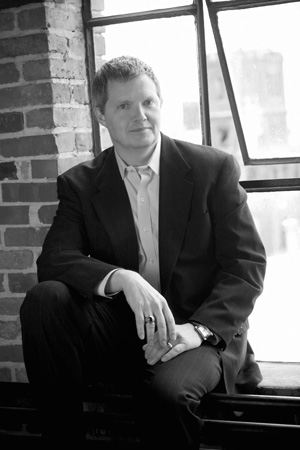
Since he bought Advent, then a struggling small company, in 2000, the firm has increased its sales sevenfold. In the process it has evolved into a pioneer in the field of experiential marketing. Through events from product launches and sales meetings, Roberson says, “We help clients connect audiences to their brand in memorable and measurable ways.”
Roberson cites a health care client that had achieved outstanding results in helping businesses lower health care costs through management of employees with chronic conditions, such as diabetes. “For example, they had call centers staffed with R.N.s,” Roberson explains, “and they’d call people with diabetes to make sure they were exercising and eating a proper diet.” It was an old-fashioned approach, but, perhaps because it was so unglamorous, the company was finding it difficult to communicate the value of its services effectively.
How, the company asked Advent, could it differentiate itself at a major trade show in Washington, D.C.? The solution, Roberson’s team suggested, was to create its own separate event. The theme would be “Hope Delivered.” When Harry Winston donated the Hope Diamond to the Smithsonian, he sent it by U.S. mail. It was a simple, reliable solution, he explained, like the health care client’s approach.
Advent orchestrated a special event at the Harry Winston Gallery of the Smithsonian in collaboration with Corporate Design Inc., a Nashville-based design firm. The client’s prospects, all C-level executives, received invitations from the Smithsonian’s curator that replicated Winston’s original mail parcel and explained the story. As part of the event, attendees would receive an after-hours, private tour led by the curator.
When you’re getting off the ground, you’re doing everything—taking out the garbage, signing the lease. But it’s easier to do all that if you believe in what you’re doing. Even though it’s kind of cliché, persevering through setbacks is the most important thing.
~ Tom Ryan
Response was “phenomenal,” Roberson says. “We were able to deliver our message in a relevant way” that reinforced the client’s brand position of simple, reliable solutions. Not only did the event create a buzz among the target audience (who told their C-suite peers), it delivered a measurable impact in the form of new business. It’s easy to see why Roberson explains the difference between experiential marketing and traditional marketing as the difference between receiving a kiss and merely watching one.
Determination
The examples of Roberson, Hunter and Ryan are unlikely to settle the old debate about whether entrepreneurs are born or made. But all three might use a different phrasing: Entrepreneurs are determined.
Even armed with good ideas and business skills, success does not come overnight. Reaching the “takeoff point,” Ryan says, took five years for his firm. “When you’re getting off the ground, you’re in the one-step-forward, two-steps-back mode. You’re doing everything—taking out the garbage, signing the lease. But it’s easier to do all that if you believe in what you’re doing. Even though it’s kind of cliché, persevering through setbacks is the most important thing.”
Hunter remembers one week when he was hit with a double blow. When a service provider upon whom Alliance had relied suddenly went bankrupt, he had to scramble to find an immediate replacement. On top of that Hunter had slipped on the stairs of his deck at home and broken three ribs; each breath sent pain shooting through his body. Instead of staying home that week, he worked harder than ever. “About 30 percent of my clients used this provider,” Hunter says. “Our credibility would have been shot had we not been able to guide them out of that. It could literally have cost us the entire business.
“You’ll always face obstacles, and some make you wonder whether you should throw in the towel. But when you overcome those obstacles, that’s what makes the journey great.”
 On the Whole
On the Whole



 Bill Frist, M.D.
Bill Frist, M.D. Joe Cashia, EMBA’95
Joe Cashia, EMBA’95 Frank Grant, EMBA’91
Frank Grant, EMBA’91
 Ernie Clevenger, EMBA’81
Ernie Clevenger, EMBA’81 Phyllis Ekdall, MMHC’09
Phyllis Ekdall, MMHC’09
